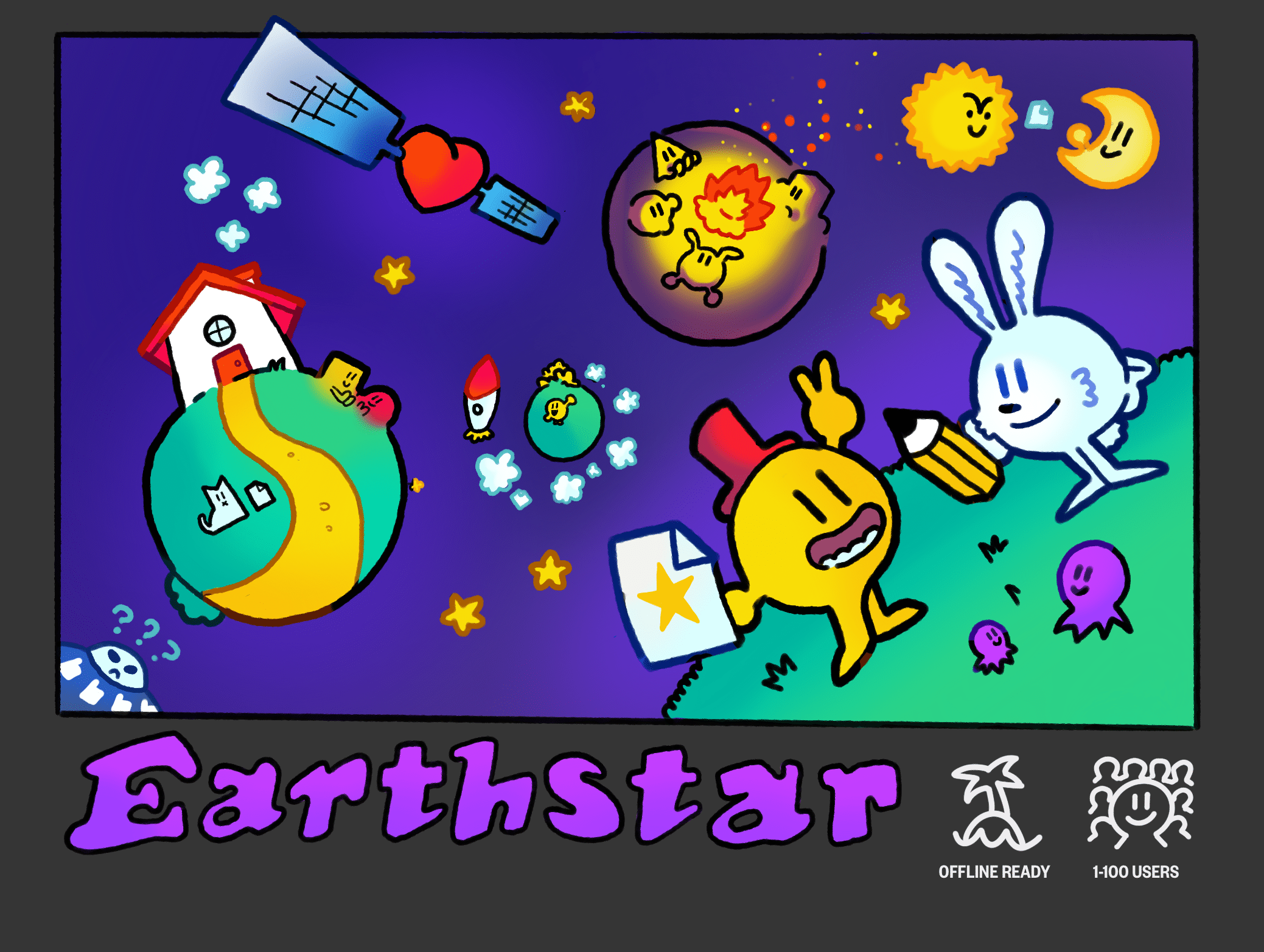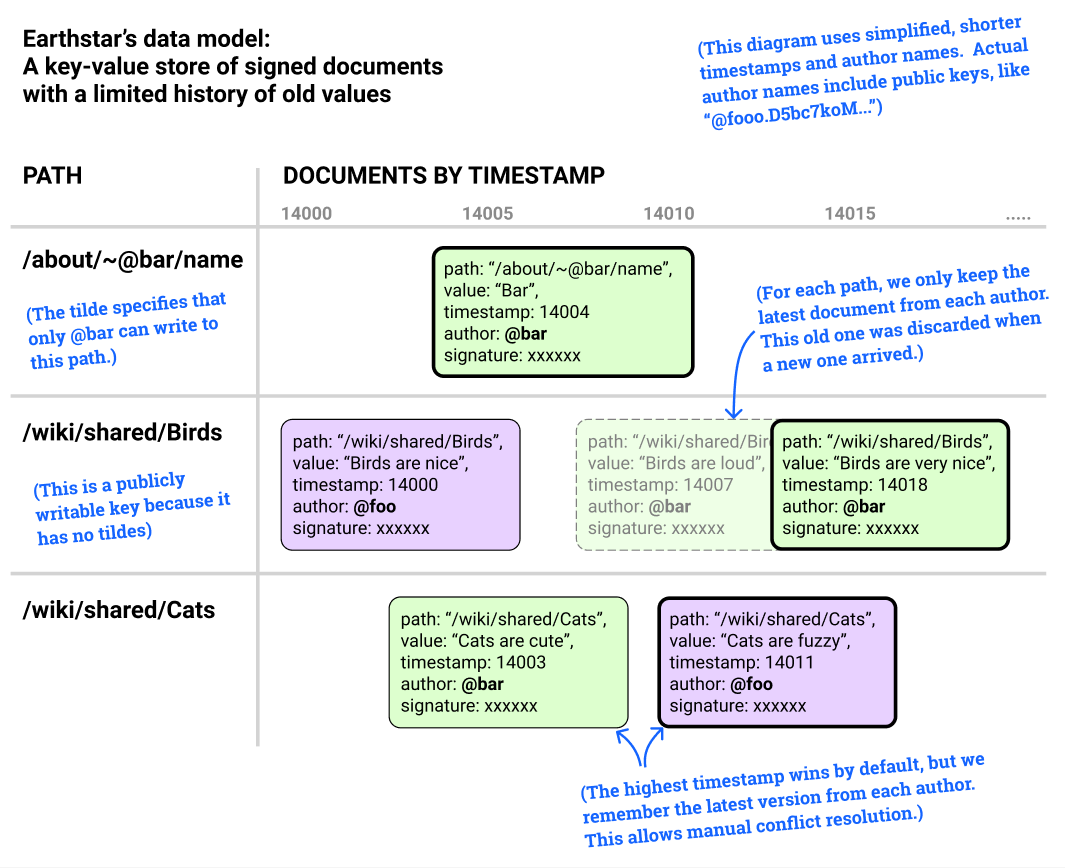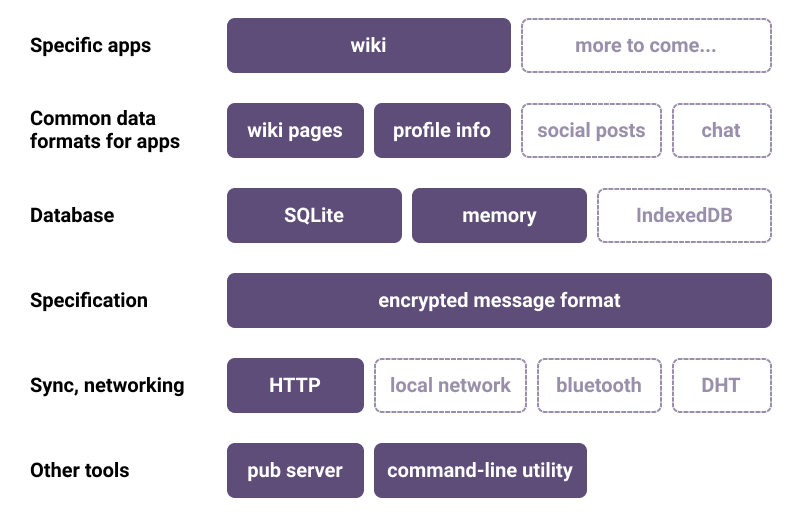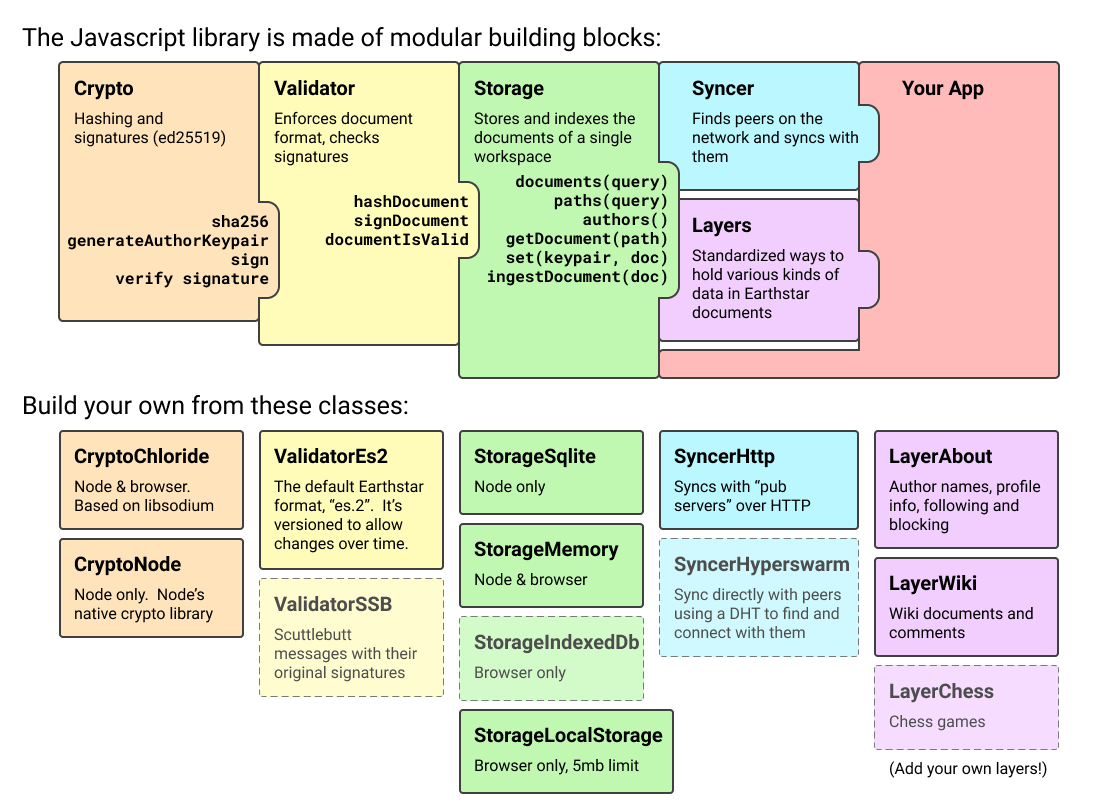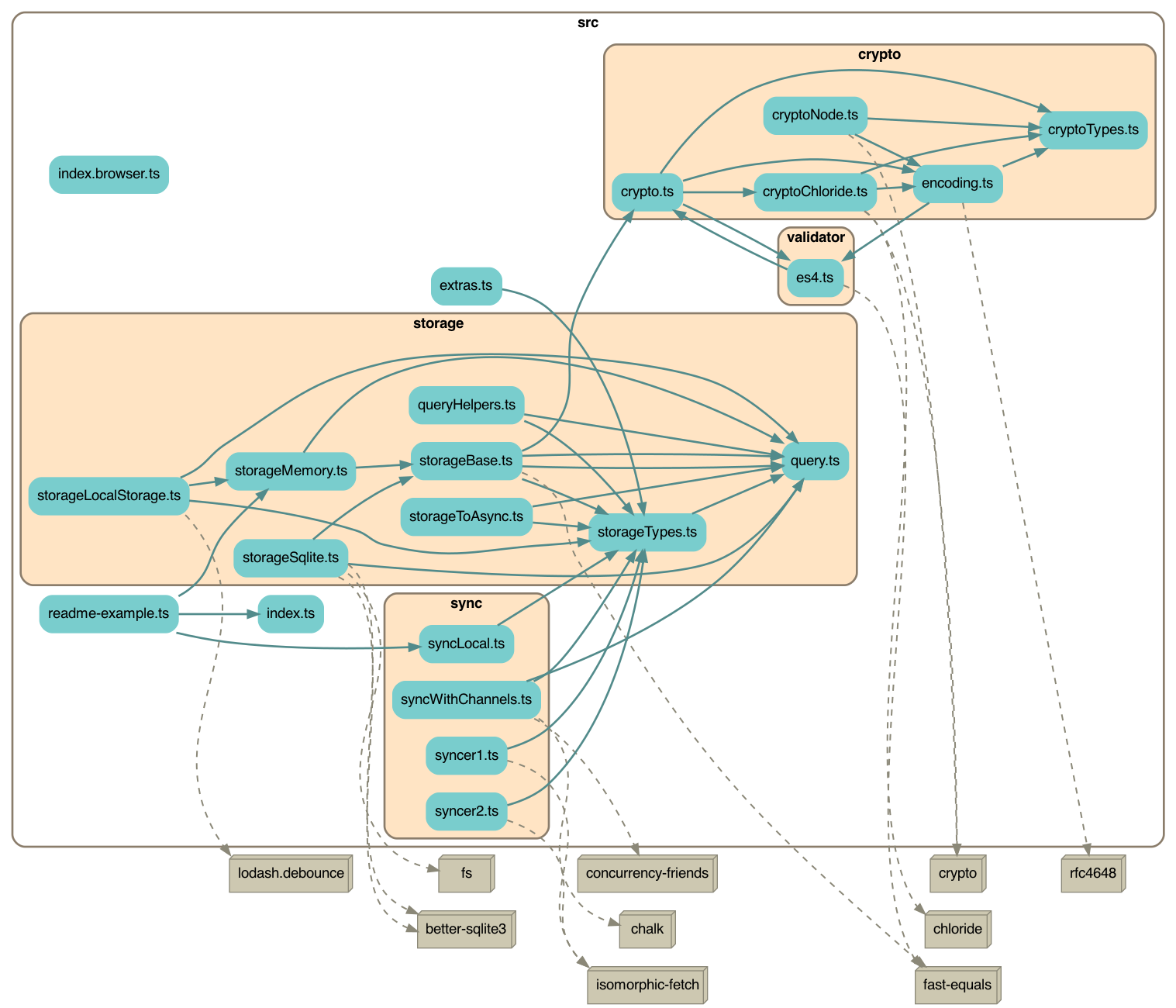Earthstar
An offline-first, distributed, syncable, embedded document database for use in p2p software -- in browsers and outside of browsers
Community / how to contribute
See CONTRIBUTING.md and CODE_OF_CONDUCT.md
Join our community on the Earthstar Discord
Links and docs
Docs for everyone:
- A Guided Tour of Earthstar -- Slides and diagrams explaining how it works
Docs for app developers:
- Overview for developers -- A quick comparison between Earthstar, CouchDB, and SSB
- Rules of Earthstar -- The scope of the project, and details of the technical invariants of the distributed system.
- Tutorial -- Make a Todo list app, step by step
- Invite code format
- Standard paths and data formats used by apps for their Earthstar documents, so apps can interoperate
Docs for core Earthstar developers:
- Earthstar Specification -- All you need to know to write an Earthstar implementation from scratch
- About syncing -- Exploring this topic in more detail
- About fancy conflict resolution -- How to add more complex conflict tracking on top of Earthstar
- About timestamps -- Exploring the limits of Earthstar's assumptions about timestamps
- Urls -- How to build URLs related to Earthstar
Related repos:
- earthstar-cli -- Command line utility
- earthstar-pub -- Server to help you sync
- react-earthstar -- Make Earthstar apps with React
- earthstar-graphql -- A GraphQL layer for handling Earthstar data
Demo apps:
- Twodays Crossing -- Ephemeral Roleplay chatroom Try it here
- earthstar-status -- Online presence messages app Try it here
- earthstar-lobby -- Text posts on a timeline. Try it here
- earthstar-wiki -- An example app built with Earthstar (deprecated)
- earthstar-os -- A toolkit for hosting and using Earthstar apps in the browser (deprecated)
Contents
- What kinds of apps can you build with Earthstar?
- Motivation
- Data model
- Block diagram
- Scope, typical usage
- Editing data; multiple users and devices; conflicts
- Security properties
- Comparisons
- Use cases
- What doesn't it do?
- Example
- Extras
- Details and notes
- Future plans
What kinds of apps can you build with Earthstar?
Tools for collaborating with groups of people. See Use-cases, below.
Motivation
Centralized services like Facebook have lots of problems: privacy, surveillance, addiction, dark patterns, ads, "real name" policies that harm minority groups, poor handling of moderation, bots, ...
These problems come from 2 root causes:
- They have a profit motive, so their purpose is to extract value from users.
- They're big, so they're a bureaucracy that can't understand the nuances of the diverse world population they serve, and they're unresponsive to demands from their users.
We'd be better off with communication services that are:
- Not for profit - run by volunteers on small, cheap servers
- Small - close to their users, locally governed, more democratic, understanding local norms and culture
This is the "federated" model, like Mastodon: instead of one big Twitter, make a thousand small Twitters.
But this has problems too -- volunteer-run servers don't last forever, and when they shut down their users lose their communities.
Earthstar goes one step further: you can communicate without servers at all, directly from device to device; or you can run Earthstar on servers ("called pubs") which help sync your data but have no authority over your account. You can easily run your own servers for yourself and your friends. Instructions coming soon.
All the authority in the system rests in the users and is enforced by cryptography, not central servers. Since servers only exist to help with syncing, and your data and identity are independent of the servers, you can easily use as many or as few servers as you want, and move between them without losing anything.
Earthstar's philosophy is that apps should be tools, not services. Authority no longer rests in a central server, it rests in each user.
Data model
An Earthstar workspace holds mutable documents with unique paths (ids), similar to leveldb or CouchDb.
Within each path, we keep the newest version of that document from each author. We discard old versions of a document from the same author.
In other words, it's a mapping from (path, author) to latest version of the document at that path, from that author.
The newest document (from any author) is considered the winner of a conflict. More details below in the "Editing data" section.
There are no transactions. The unit of atomic change is the document.
Block diagram
Simplified diagram of the entire system. The dashed boxes are not implemented yet.
A more detailed look at this Javascript implementation:
Scope, typical usage
Each user will have their own instance of an Earthstar database in whatever app they're using -- in the browser or native. There might also be some instances on cloud servers ("pubs"). The databases can sync with each other across HTTP or duplex stream connections.
Each database instance can hold a subset of the entire data, specified by a query such as "paths starting with a certain substring", "paths written after a certain timestamp", etc.
The universe of data is divided into workspaces -- collections of documents accessed by certain users. Syncing happens one workspace at a time.
Read the vocabulary and concepts documentation for more about workspaces.
Editing data; multiple users and devices; conflicts
A single author can use multiple devices at the same time. You "log into" a device by providing your public and private key, like a username and password.
Data is mutable. Authors can update paths with new documents. The old data is thrown away and doesn't take up space. You can "delete" data by overwriting it with an empty document.
There is a write permission system to allow only certain authors to write to certain paths. Other paths can be written by anyone.
Soon, there will also be a way to write immutable messages, for use cases where you need those.
Conflicts from a single author (on multiple devices) are resolved by timestamp and the old data is discarded. Conflicts from multiple authors are resolved by timestamp by default, but the old data is kept to allow for manual conflict resolution if needed.
Security properties
Each author is identified by a public key.
Data updates are signed by the author, so it's safe for untrusted peers to help host and propagate data. (Soon) you will also be able to encrypt data so untrusted peers can host it without reading it.
Malicious peers can:
- Withold updates to individual documents during a sync
- See the data (until encryption is implemented, soon)
- Know which peers they're connecting to
Malicious peers cannot:
- Alter documents from another author
- Forge new documents signed by another author
Although malicious peers can withold individual documents, as long as there are honest peers around you will eventually get the latest verison of everything.
Because it allows partial sync and mutation of data, Earthstar doesn't cryptographically guarantee that you have a complete dataset with no gaps from a certain author. Authors could chose to use sequential paths or embed a blockchain of hash backlinks into their messages, and you could verify these in your app (outside of Earthstar).
Comparisons
Like leveldb, but:
- multi-author
- it syncs
Like CouchDb, but:
- with signatures and encryption, so untrusted nodes can help move data around.
Like Scuttlebutt, but:
- one author can use multiple devices
- data is mutable
- instead of an append-only log, it's a set of mutable items
- supports partial replication
- will sync over HTTP, not just TCP, so it's easy to host in places like Glitch.com
- has less strict data guarantees -- you can't tell if you have someone's entire dataset or not
Like DAT, but:
- multi-author, multi-device
- simpler
- communicates over HTTP, making it easier to deploy pub servers and run in regular browsers
- instead of an append-only log, it's a set of mutable items
Like IPFS, but:
- multi-author, multi-device
- mutable
- documents are signed by the author
- currently more focused on pub servers for replication and not DHT swarms, although swarm support is coming
Like Firebase, but:
- open source
- distributed
Sometimes immutability is needed, like if you're running a package registry or want an audit log. For social-network style use cases, though, immutability can be a privacy liability instead of a desirable guarantee.
Use cases
Earthstar can be used for invite-only tools where you have all the data (think Slack) and large open-world tools where you only replicate part of the entire dataset (think SSB). Apps tell Earthstar what paths and what authors to replicate.
These styles of app could be built on top of Earthstar:
- wikis
- chat: Slack, IRC
- social: Facebook, Scuttlebutt, Discourse, LiveJournal, Forums
- microblogging: Twitter, Mastodon
- productivity: Trello, GitHub Issues, Asana, Todo lists
- office: Google sheets
- art: Collaborative drawing or music tools, multi-user Twine for making interactive fiction games
What doesn't it do?
Earthstar's conflict resolution chooses entire document versions as winners, it doesn't merge versions together. This means it's a poor choice for simultaneous multi-user editing of large text documents. For that, you could use a fancier CRDT like Automerge and rely on Earthstar to move and sync the patches it produces. Or you can design apps to store large documents as smaller pieces, like paragraphs, or design other ways to collaborate such as comments or chat where people don't simultaneously edit the same text.
It will eventually stream live changes, but it doesn't yet. For now, syncing is done on demand.
The cryptography is not audited yet. It's based on libsodium which is also used by Scuttlebutt and many other projects.
Earthstar is more focused on autonomy than on anonymity. It doesn't have perfect forward secrecy. Your messages are signed by your key so it's easy to prove which identity said something. We try to reduce IP address exposure etc, but if you have a serious need for anonymity you should layer it on something like Tor or use other tools that are anonymity-focused.
Earthstar doesn't provide transactions or causality guarantees.
Moderation and blocking support is not figured out yet but it's important and we'll get there eventually. In the meantime, apps can layer their own moderation and blocking support on top of Earthstar.
Example
The main interface to Earthstar is the Storage class:
export interface IStorage {
// A Storage instance holds the documents of a single workspace.
// To construct one, you need to supply
// * a workspace address
// * a list of Validator classes, for the document formats you want to support
// * various other options such as database filenames, specific to that kind of Storage
// The workspace held in this Storage object.
workspace: WorkspaceAddress;
// onChange is called whenever any data changes:
// * after every set()
// * after every ingestDocument()
// * after each document obtained during a sync (because that happens via ingestDocument())
// It doesn't yet send any details about the changes to the callback, but it should.
// Subscribe with onChange.subscribe(...cb...);
onChange: Emitter<undefined>;
// QUERYING
// Return the documents that match the query.
// Default sort is path ASC, then timestamp DESC (newest first within same path)
// but query objects will eventually include sort options.
documents(query?: QueryOpts): Document[];
// Same as documents(), but only return the distinct paths of the matching documents (duplicates removed).
paths(query?: QueryOpts): string[];
// Same as documents(), but only return the content properties of the matching documents.
contents(query?: QueryOpts): string[];
// List of authors that have ever written in this workspace.
authors(now?: number): AuthorAddress[];
// INDIVIDUAL DOCUMENT LOOKUP
// Get one document by path.
// Only returns the most recent document at this path.
// To get older docs at this path (from other authors), do a query.
getDocument(path: string, now?: number): Document | undefined;
// Same as getDocument(path).content -- just the content of that document
getContent(path: string, now?: number): string | undefined;
// WRITING
// Write a document.
// To do this you need to know an author's private key, which is part of the keypair object.
// The DocToSet type is similar but smaller than a regular document:
// format: which document format to use
// path
// content
// timestamp: optional. If absent or zero, the current time is set for you
// - no workspace -- this Storage object knows what workspace it is
// - no author -- it's provided in the keypair argument
// - no signature -- it will be signed for you
// Timestamps should only be set manually for testing purposes. Normally they should be
// omitted so they default to now.
// The timestamp will also be increased so that it's greater than any previous doc
// at the same path (from any author), to guarantee that this write will be the conflict winner.
//
// now should usually be omitted; it's used for testing and defaults to Date.now()*1000
set(keypair: AuthorKeypair, docToSet: DocToSet, now?: number): WriteResult | ValidationError;
// Save a document from an external source to this Storage instance.
// The document must be already signed.
// This is mostly used for syncing.
//
// now should usually be omitted; it's used for testing and defaults to Date.now()*1000
ingestDocument(doc: Document, now?: number): WriteResult | ValidationError;
// Internal helper method to do a one-way pull sync.
_syncFrom(otherStore: IStorage, existing: boolean, live: boolean): number;
// TODO: add now? param to _syncFrom and sync
// Two-way sync to another local Storage instance running in the same process.
// This is not network-aware. Network sync is handled by the Syncer class.
sync(otherStore: IStorage, opts?: SyncOpts): SyncResults;
// TODO: Delete data locally. This deletion will not propagate.
// forget(query : QueryOpts) : void; // same query options as paths()
// Close this storage.
// All functions called after this will throw a StorageIsClosedError,
// except you can call close() as many times as you want.
// Once closed, a Storage instance cannot be opened again.
// TODO: what happens when a long-running process like a sync is happening, and the Storage is closed?
close() : void;
// Find out if the storage is closed.
isClosed() : boolean;
}Usage example (readme-example.ts):
import {
StorageMemory,
ValidatorEs4,
generateAuthorKeypair,
isErr,
} from 'earthstar';
// Create a database for a particular workspace, '+gardening.xxxxxxxx'
// We've chosen to use the latest 'es.4' feed format so we supply the matching validator.
let storage = new StorageMemory([ValidatorEs4], '+gardening.xxxxxxxx');
// Users are called "authors".
// Let's make up some authors for testing.
// A keypair is { address: '@aaaa.xxx', secret: 'xxx' }.
// (xxx represents base32-encoded ed25519 keys)
let keypair1 = generateAuthorKeypair('aaaa');
let keypair2 = generateAuthorKeypair('bbbb');
if (isErr(keypair1)) { throw "oops"; } // error could happen if our author shortname broke the rules
if (isErr(keypair2)) { throw "oops"; }
let author1 = keypair1.address;
let author2 = keypair2.address;
// You can set documents at specific paths, like a filesystem or key-value store.
storage.set(keypair1, { format: 'es.4', path: '/wiki/Strawberry', content: 'Tasty' });
storage.getContent('/wiki/Strawberry'); // --> 'Tasty'
// One author can use multiple devices with no problems.
// Conflicts are resolved by timestamp.
// Here the same author overwrites their previous document,
// which is forgotten from the database.
storage.set(keypair1, { format: 'es.4', path: '/wiki/Strawberry', content: 'Tasty!!' });
storage.getContent('/wiki/Strawberry'); // --> 'Tasty!!'
// Multiple authors can overwrite each other (also by timestamp).
// Here author 2 writes to the same path.
storage.set(keypair2, { format: 'es.4', path: '/wiki/Strawberry', content: 'Yum' });
storage.getContent('wiki/Strawberry'); // --> 'Yum'
// Within a path we keep the most-recent document from each author,
// in case we need to do better conflict resolution later.
// To see the old versions, use a query:
storage.contents({ path: '/wiki/Strawberry', includeHistory: true });
// --> ['Yum', 'Tasty!!'] // newest first
// Get the entire document to see all the metadata as well as the content.
storage.getDocument('/wiki/Strawberry');
// --> {
// format: 'es.4',
// workspace: '+gardening.xxxxxxxx',
// path: '/wiki/Strawberry',
// content: 'Yum',
// author: '@bbbb.xxxxxxx',
// timestamp: 1596676583283000, // time in microseconds: Date.now()*1000
// signature: 'xxxxxxxx',
// }
// WRITE PERMISSIONS
//
// Paths can specify which authors are allowed to write to them.
// Author names in a path prefixed by '~' can write to that path.
//
// Examples:
// (in these docs, "xxx" is shorthand for a long public key)
// One author write permission:
// '/about/~@aaaa.xxx/name' -- only @aaaa.xxx can write here.
// '/about/~@aaaa.xxx/follows/@bbbb.xxx' -- only @aaaa.xxx can write here
// Public:
// '/wall/@aaaa.xxx' -- no tilde, so anyone can write here
// '/wiki/Kittens' -- no tilde, so anyone can write here
// Multiple authors:
// '/whiteboard/~@aaaa.xxx~@bbbb.xxx' -- both @aaaa.xxx and @bbbb.xxx can write here
//
// Here we'll set the author's display name by writing to their profile document.
storage.set(keypair1, {
format: 'es.4',
path: '/about/~' + keypair1.address + '/profile.json',
content: JSON.stringify({displayName: 'Suzie'}),
});
// You can do leveldb style queries.
// See the /src/storage/queries.ts for details on queries.
storage.paths()
storage.paths({ pathStartsWith: '/wiki/', limit: 10 })
// You can sync to another Storage that has the same workspace address
let storage2 = new StorageMemory([ValidatorEs4], '+gardening.xxxxxxxx');
storage.sync(storage2);
// Now storage and storage2 are identical.
// Get notified when anything changes.
let unsub = storage.onChange.subscribe(() => console.log('something changed'));
// Later, you can turn off your subscription.
unsub();Extras
Deleting your data
There's a special function to delete all of your own data from a workspace.
It has limitations; I wish we could do better but this is the best that's possible given the current design of Earthstar.
import { deleteMyDocuments } from 'earthstar'
let { numDeleted, numErrors } = deleteMyDocuments(storage, authorKeypair);
// numErrors is how many documents failed to be deleted. It should be zero.This overwrites all the documents you created with empty strings, which is the usual way to "delete" things from Earthstar. These deletions will propagate across the network, erasing your content from everyone in the workspace the next time they sync.
If you do this, make sure you give Earthstar a chance to sync with pubs and get your empty versions out there, before you turn off your computer or log out of the workspace.
What's deleted:
- The content of documents that you wrote
- The hashes of your original content
Some metadata is left behind forever:
- The paths of those documents
- Their original timestamps plus 1 microsecond, so the empty version wins
- Your author address
App authors should consider the privacy implications of the way their paths are constructed, since the paths of documents can't be removed. For example, use random IDs in paths instead of descriptive titles.
Recall that if multiple people have written to the same path, Earthstar keeps one document from each of those people. There are two scenarios to consider there:
- If you were one of the older writers to that path, your document will be emptied and the newer document from someone else will be unaffected.
- If you were the most recent writer, your document will be emptied and, since this is the most recent one, apps will now treat the whole paths as if it was gone. The older docs by other people are still accessible but in most apps it will look like the path is empty.
Your ephemeral documents (which have expiration dates) will also be emptied of content. Their expiration date will not be changed. When that date arrives, they will be completely and physically deleted. (It would be nice to make them expire sooner but that might prevent the empty version from propagating across the entire network; generally expiration dates can be extended but not shortened.)
Details and notes
NOTE The rest of this README is somewhat out of date!
Signatures
Document hashes are used within signatures and could be used to link to specific versions of a doc.
There's a simple canonical way to hash a document. See [docs/serialization-and-hashing.md](Serialization and Hashing) for details.
To sign a doc, you sign its hash with the author's secret key.
Note that docs only ever have to get transformed INTO this representation just before hashing -- we never need to convert from this representation BACK into a real doc -- so it can be nice and simple.
There is no canonical encoding for storage or networking - only the canonical hash encoding, above. Databases and network code can represent the doc in any way they want.
The hash and signature specification may change as the schema evolves beyond es.4. For example there may be another schema ssb.1 which wraps and embeds SSB messages and knows how to validate their signatures.
Sync over duplex streams:
Here's a very simple but inefficient algorithm to start with:
sort paths by (path, timestamp DESC, signature ASC)
filter by my interest query
while true:
both sides send next 100 docs to each other as (path, timestamp, signature)
both sides figure out what the other needs and send it in full
both sides send 'ok'
Sync over HTTP when only one peer is publicly available:
Here's a very simple but inefficient algorithm to start with:
the client side is in charge and does these actions:
sort paths by (path, timestamp DESC, signature ASC)
filter by my interest query
GET /interest-query the server's interest query
while true:
GET /doc-versions?after='foo/bar'&limit=100 from server
compare with my own docs
pull things I need
POST /batch-get-docs paths=[foo, foo/a, foo/b, ...]
push things they need:
POST /batch-ingest-docs docs=[ {...}, {...} ]
Note that everything happens in batches instead of infinite streams. The code avoids using streams.
For efficient sync, we'll use something similar to this set reconciliation algorithm described by Aljoscha Meyer.
HTTP API
This is out of date -- See earthstar-pub for the latest
HTTP replication:
GET /interest-query the server's interest query
return a list of query objects -- what does the server want?
GET /doc-versions [after='...'] [limit=100] [before='...']
return array of docs with just path, version, first N bytes of signature
POST /batch-get-docs paths=[foo, foo/a, foo/b, ...]
return complete docs
POST /batch-ingest-docs docs=[ {...}, {...} ]
ask server to write these docs
return 'ok' or error
Future plans
Immutable documents by putting "(hash)" in the path
You'll be able to put the literal string "(hash)" in a path. It will be replaced with the hash of that document. Since no other document can have the same path, it will be impossible to overwrite or delete this document, making it immutable.
- Signatures are based on the shorthand path
- Upon ingestion to the db, replace
(hash)with the actual hash of the document - Database lookups use the full expanded path
- Across the network, we only need to send the shorthand path. The expanded path is derived state.
(hash)lets you create docs that can never be overwritten, because you can never make another doc with the same hash.- The expanded path needs to contain a character that's not allowed in regular paths, so the only way to get that path is via
(hash). e.g. a percent sign like(hash)-->%a93jDj39sdH...
Path overlays
- It would be easy make an overlay view of different path prefixes ("folders") within a Storage
- Or overlay two Storage instances
- For example you could combine
/wiki/~@a.xxxxand/wiki/~@b.xxxxinto one namespace
Dependency chart
Low level files on the left, high level on the right.
low.ts <-- high.ts means low.ts is imported by high.ts.
Omitting test and util because they had too many arrows, and not showing how index.ts brings everything together.
Run npm run depchart to regnerate this. It's made using depchart by @cinnamon.
